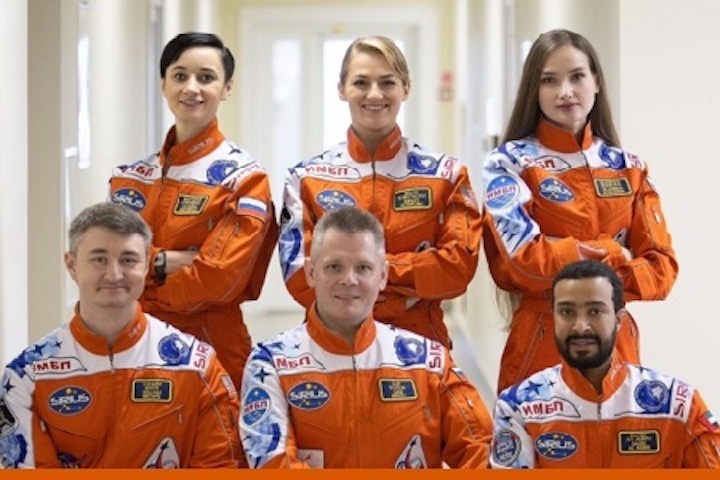9.11.2021

Emirati astronaut Saleh al-Ameri (front row, right )
The UAE Analog Mission#1 – which aims to mimic the isolation of a space mission – has begun with the crew entering the NEK ground-based analogue facility in Moscow, Russia.
Emirati astronaut Saleh AlAmeri is part of an international crew of six who will spend eight months in near isolation as part of the Scientific International Research in Unique Terrestrial Station (SIRIUS-21).
Other crew members include Oleg Blinov, Ekaterina Karyakina and Victoria Kirichenko from Russia’s Institute of Biomedical Problems of the Russian Academy of Sciences (IBMP) along with Ashley Kowalski and William Brown from the US space agency, NASA.
The launch of the mission was attended by Salem AlMarri, Deputy Director-General, MBRSC, Adnan AlRais, Mars 2117 Programme Manager, MBRSC and Mohammad bin Nashooq, UAE Analog Programme manager, who were part of the final preparations before the crew entered the Medical and Technical Ground-Based Experimental Facility (NEK) of IBMP.
The mission is integral to understanding the effects of isolation and confinement on human psychology, physiology and team dynamics to help prepare for long-duration space exploration. The 240-day mission will replicate various stages and scenarios of a manned mission to the Moon which follows phases such as launch, orbit, landing, and return.
The backup crew includes Emirati analog astronaut Abdalla AlHammadi, Vera Bakhtereva, Evgeny Prokyopyev and Alexey Federov from IBMP, Brian Evarts and Tatyana Delaney from NASA will serve as the back-up crew for the mission and support the primary crew from the operations centre.
Hamad Obaid Al Mansoori, Chairman, MBRSC said: “Our cooperation with IBMP and NASA is in line with our ongoing contributions to the global space sector through collaborative efforts and we are proud to be part of the SIRIUS-21 mission. We wish the crew all the very best and look forward to gain unique insights through the mission and enrich us with crucial data that will help current and future generations of scientists and engineers for long-duration space exploration.”
Yousuf Hamad AlShaibani, Director-General, MBRSC said: “With the UAE Analog Mission, we are further delving deeper into our capabilities as a spacefaring nation. This is our first mission where an Emirati analog astronaut will live and work entirely independent in their habitat for 8 months. The mission is a further milestone in the scientific cooperation between MBRSC, IBMP and NASA and an expression of the excellent relations we’ve had so far. We wish the crew all the very best and look forward to gaining a new perspective on long-duration spaceflight journeys and interplanetary exploration.”
The analog astronauts will conduct over 70 experiments during the mission. Five entries from four universities in the UAE in the fields of physiology, psychology and biology are also part of these experiments that were selected after consultation with the mission partners in Russia.
Shamma Al Mutawa, from the Mohammed Bin Rashid University of Medicine and Health Sciences, will support the study on the effects of prolonged exposure to a space analog environment on cardiovascular variability and cardiopostural interactions, which is one of the research topics selected for the mission.
Meanwhile, the research topic selected from the University of Sharjah proposes the study of delineating the effects of stress-induced by confinement and isolation on circulatory and skeletal muscle function of crewmembers during the mission measuring clinical, genomics, transcriptomic, and proteomics parameters.
Other selected topics for the mission include the American University of Sharjah’s research on the mitigation of mental stress in isolation and confined environment, while the United Arab Emirates University has proposed two research topics, one on the psychological challenges of isolation during human spaceflight: the role of motivational dynamics and the second on the high intense intermittent training as a countermeasure to prevent bone loss and insulin resistance in space environment.
The crewmembers are isolated and given certain tasks that they need to do, without any communication to the outside world. Previous missions completed in the series include Sirius-17 in 2017, that lasted 17 days and Sirius-19 in 2019, which was a 120-day mission. Sirius-21 is stage III of the Sirius Project and is a 240-day isolation experiment that reproduces the main features of a future interplanetary mission. The experiment includes leaving the Earth’s orbit, flight to a hypothetical planet with a subsequent orbital flyby to find a landing site, landing of an expedition module for conducting scientific research, staying in the orbit to perform operations for receiving transport ships, remote control of robotic vehicles for building a base, and return to Earth
The UAE’s participation in the SIRIUS mission will play a key role in developing Emirati capabilities and contribute to the development of the Mars 2117 Programme, which aims to establish human colonies in Mars by 2117. The Mars 2117 initiative and is funded by the ICT fund of the Telecommunications and Digital Government Regulatory Authority.
Quelle: SATELLITEPROMECOM
